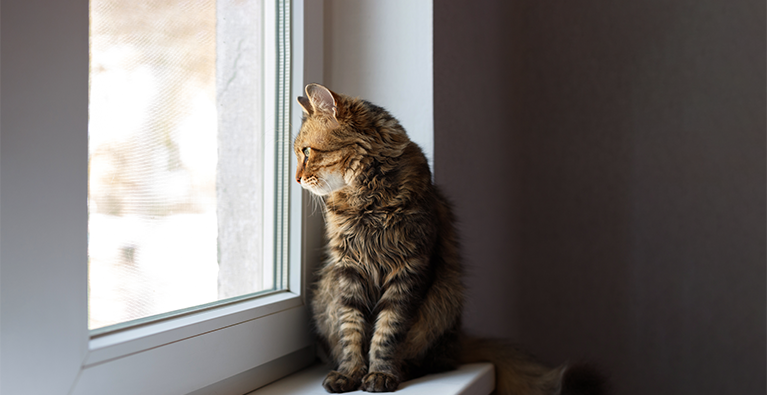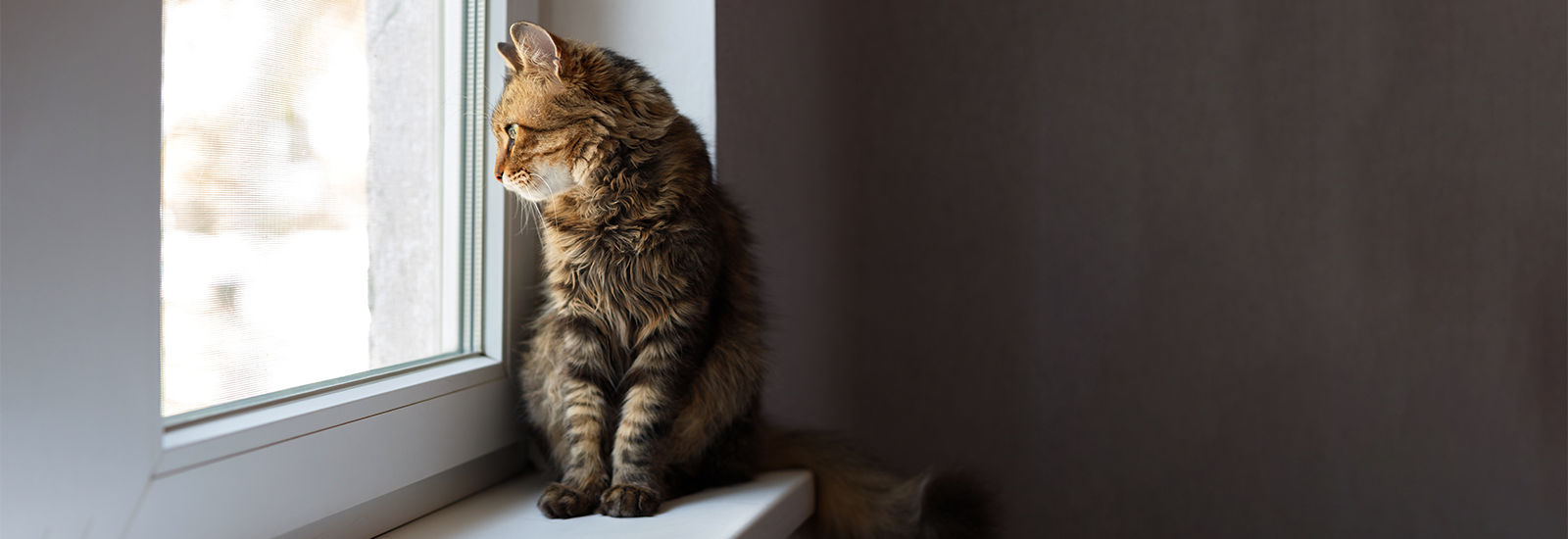Bladder infections in cats
A bladder infection (also known as “cystitis”) in a cat can have a number of causes and can be very painful. As opposed to a urinary tract infection, in which the bladder, kidneys and urinary tract are affected, a bladder infection only affects the bladder. Here you will find out everything you need to know about symptoms, medication, home remedies, how long it takes for a cat to recover, and nutrition.
Symptoms of a bladder infection in cats
Many cats will have to deal with cystitis at least once in their lives, because there are many factors that can lead to this condition. If you suspect that your pet is suffering from a bladder infection, a visit to the vet is always advisable. Do not wait to see if things get better on their own, because if you wait too long, complications can arise. It is better to have your cat examined for cystitis by a vet if you notice any of the following symptoms:
- Frequent urination
- Cries indicating discomfort when urinating
- Relatively small amounts of urine
- Blood in the urine
- Intense smell
- Puddles of urine in your home
- Uncontrolled loss of urine
- Licking the genital area more than usual
- Arched back when urinating
- Fatigue
- Reluctance to eat
These symptoms can occur either individually or simultaneously. If an infection of the bladder is not recognised and treated in time, it can become chronic, with the following symptoms:
- Fever
- Reluctance to eat
- Vomiting
- Loss of weight
- Movement disorders
Causes of a bladder infection
Some diseases have a typical trigger. This is, however, not the case with cystitis. There are a number of possible causes. Some can be explained in medical terms, but in some cases the trigger cannot be identified. Vets refer to this as “idiopathic cystitis”. It is, of course, better if the cause is known so that it can be specifically treated and, if possible, eliminated for the future. If the vet is unable to make a conclusive medical diagnosis, the pet owner may be able to provide some decisive information.
Possible causes of cystitis in cats:
- Drinking too little water
- Bacterial inflammation
- Sub-optimal nutrition
- Urinary crystals in the urine
- Bladder stones
- A tumour
- Malformation of the bladder
- Everyday stress
- An overactive thyroid
- Being overweight
- Lack of exercise
- Diabetes
- Renal insufficiency
- Feline Leukosis
- No recognisable cause (idiopathic cystitis)
Male cats are more likely to suffer from bladder infections than females. This is partly due to the fact that their urethra is narrower, but it is also because they are particularly territorial in their behaviour and therefore tend to clash more frequently with other male cats, which can lead to stress.
What should you do if your cat has a bladder infection?
Only a vet can reliably establish whether a cat has a bladder infection or whether it is another condition with similar symptoms. You should therefore always consult a vet if you suspect that your cat has cystitis.
Otherwise there is the risk that your pet will be in more and more pain when urinating. It can also lead to severe expansion of the bladder and damage to the kidneys. It is therefore important not to wait too long to see if the situation improves with time. It is better to arrange a check-up at the vet as soon as possible.
![[Translate to EN:] Katze beim Tierarzt](/fileadmin/media/images/Magazin/katze/02-Katzengesundheit/blutdruck-bei-der-katze/katze-beim-tierarzt-magazin-blutdruck-bei-der-katze-contentimage-560x375.jpg)
What medication is given to cats with bladder infections?
The choice of medication depends on the vet’s diagnosis. A fresh urine sample is a great help here. This is often difficult to obtain quickly at the surgery, so it is up to the cat’s owner. You may be able to collect some urine at home in a bowl or cup. You can also use a pipette to obtain a sample from a puddle of urine or temporarily fill the litter tray with non-absorbent cat litter or cover the litter with cling film. Then tip up the tray so that you can collect the urine in a receptacle. It is always important to take the urine sample to the vet within the next few hours.
As soon as the vet has a urine sample, they can analyse whether it contains any crystals or bacteria. This may be enough for a quick result, however a blood test and ultrasound scan may also be necessary. Depending on the findings, the following medications are used to treat cystitis:
- An antibiotic to treat a bacterial infection
- Pain-relieving medication
- Complementary or dietary food
- Antispasmodic (spasm-relieving) medication
- Measures to combat crystals in the urine
- Surgical treatment of a blocked urinary tract
What home remedies can help with a bladder infection?
Home remedies only have a supportive effect. The pain involved with cystitis and the possible consequences should not be underestimated, which is why you should always pay a visit to the vet. In addition to taking medication, teas (camomile, horsetail) are typical household remedies. These are known for their anti-inflammatory and diuretic effects. Simply prepare the tea as usual with boiling water and give it to the cat when it has completely cooled down. There are also special cat teas available on the market.
How long does a bladder infection take to heal?
When a cat is given antibiotics and painkillers for a bacterial bladder infection, the healing process usually only takes a few days. Often you will see an improvement after just one day. Do not, however, be tempted to discontinue the treatment prematurely. Make sure that your cat receives the antibiotic for the entire period agreed with the vet in order to minimise the risk of resistant bacteria developing.
If the cause of cystitis is not bacteria, but for example struvite stones, the treatment may take several weeks.
How can future bladder infections be avoided?
Here, the cause of the cystitis is decisive:
- Immune system
A weak immune system can increase the risk of a bladder infection. The cause of this could be poor-quality food. It is therefore important to always give your cat healthy, high-quality food. If your pet is not drinking enough, this can also be a contributory factor for cystitis because this can, among other things, promote the formation of stones in the urine. It is then advisable to make sure that your cat has several different places to drink in your home and to avoid only giving it dry food. Try alternating between wet and dry food, or simply get rid of the dry food altogether, and only feed your cat wet food. If it turns out that urinary stones were the cause of the bladder infection, you can use special food for urinary stones. This helps to regulate the pH value of the urine.
- Hygiene
If the cystitis was caused by a bacterial infection, you should think about improving the hygiene conditions in your home: does every cat have its own litter tray and are they always cleaned properly? You should always remove the faeces immediately, change the cat litter at regular intervals and clean the tray thoroughly with hot water. This also applies to the food and water bowls.
- Stress
One cause of cystitis that should not be underestimated is psychological stress. The reason behind this could be another cat, a dog, or intrusive children. Not having enough space to retreat to, and feeling disturbed at the food bowl or litter tray can also cause stress for a cat. These and other stress factors should be eliminated in order to minimise the risk of a chronic bladder infection.
You may also like this

Kidney problems in cats
If its urine shows abnormalities, your cat should be examined

Urinary tract stones in cats
A suitable dietary food can help with urinary tract stones

Excess weight in cats
If a cat weighs too much, there is the risk of health problems

Diabetes in cats
Cats too can suffer from elevated blood sugar levels

